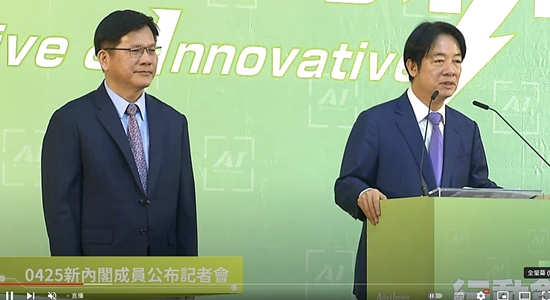
The rationale, as summarized in the headline of Lin Chia-lung’s article: “With growing tension in the strait, Taiwan needs to be in the UN.” When, since 1949, has there ever not been growing tension in the Taiwan Strait?
But Lin, the Republic of China’s minister of foreign affairs (shown above with President Lai Ching-te), also says in the first line of his analysis for the Australian Strategic Policy Institute that it is “long past time for Taiwan again to be included in the United Nations.”
Yes. Taiwan should have been welcomed back into the UN the day after it was kicked out in 1971.
On September 12, 2001, the Taipei Times reported on one of the things that happened instead.
“The day after the Republic of China lost its UN seat, Frederick Chien, the foreign ministry’s director-general of the Department of North American Affairs, received a phone call from an American boy at Taipei’s UN mission located on Second Avenue in New York City.”
The boy said: “I heard my father say that you lost your seat at the UN. You must be very sad. If you have no place to go, we have rooms at our home. Please come and join us.” But the international politics resulting in the seating of the People’s Republic of China and the unseating of the Republic of China has proved to be harder than this to fix.
Today, Foreign Affairs Minister Lin Chia-lung says:
[The UN must] stop succumbing to China’s pressure and oppose distortion of the 1971 UN General Assembly Resolution 2758, by which the People’s Republic of China replaced the Republic of China (the government based in Taipei, Taiwan) in the UN.
China wilfully misrepresents Resolution 2758 by conflating it with its own ‘one-China principle’, which insists that Taiwan is part of China (unlike the ‘one-China policies’ adopted by many countries, which merely recognise the People’s Republic of China without saying that it includes Taiwan). In doing so, China has relentlessly suppressed Taiwan’s legitimate right to meaningfully participate in the UN and its specialised agencies.
This misrepresentation has far-reaching consequences beyond denying Taiwanese citizens and journalists access to UN premises and preventing them from visiting, attending meetings and engaging in newsgathering. In fact, Beijing’s tactic of distorting the meaning of Resolution 2758 to spread the fallacy that Taiwan is part of the People’s Republic of China is one of the key elements in a wider campaign to establish the legal basis for justifying a future armed invasion of Taiwan.
In fact, Resolution 2758 merely addresses the issue of China’s representation in the UN. It does not mention Taiwan. It neither states that Taiwan is part of China nor ascribes to China any right to represent Taiwan in the UN system. In other words, the resolution has nothing to do with Taiwan.
I can follow most of Lin’s argument, but not the statement that Resolution 2758 “has nothing to do with Taiwan” (or rather the Republic of China); or that China—by itself?—“has relentlessly suppressed Taiwan’s legitimate right to meaningfully participate in the UN and its specialised agencies.”
In 1971, Resolution 2758 both asserted that the representatives of the PRC were “the only legitimate representatives of China to the United Nations” and acted “to expel forthwith the representatives of Chiang Kai-shek [a dishonest way of referring to the Republic of China] from the place which they unlawfully occupy at the United Nations and in all the organizations related to it.”
Resolution 2758 itself, enacted by member nations, does not reject the ROC’s right to “meaningfully participate in the UN and its specialised agencies.” But it does reject the right of its representatives to occupy a place either at the UN or, in the words of the resolution, “in all the organizations related to it.” The question then is what is meant by “meaningful participation.” At a certain point, meaningful participation in representative bodies is tantamount to representation.
In any case, the resolution obviously does have something to do with the Republic of China.
But nobody needs to assert otherwise in order to argue that the ROC has never been part of the PRC and is not declared to be so by Resolution 2758 (as PRC Premier Zhou Enlai recognized at the time of its passage); that, as Lin says, “China’s expansionism will not stop at Taiwan,” as shown for example by its actions in the South China Sea; that “Everyone must not only reaffirm their concerns about Beijing’s coercive behaviour but also work together to prevent its unlawful actions”; that “For a more secure and better world, the UN should include Taiwan.”
Also see:
Taipei Times: “Taiwan to stand with democracies: Lai”
“SOVEREIGNTY EMPHASIZED: President William Lai said that Taiwan ‘absolutely will not sign’ an agreement with Beijing implying that the nation is part of China.”





